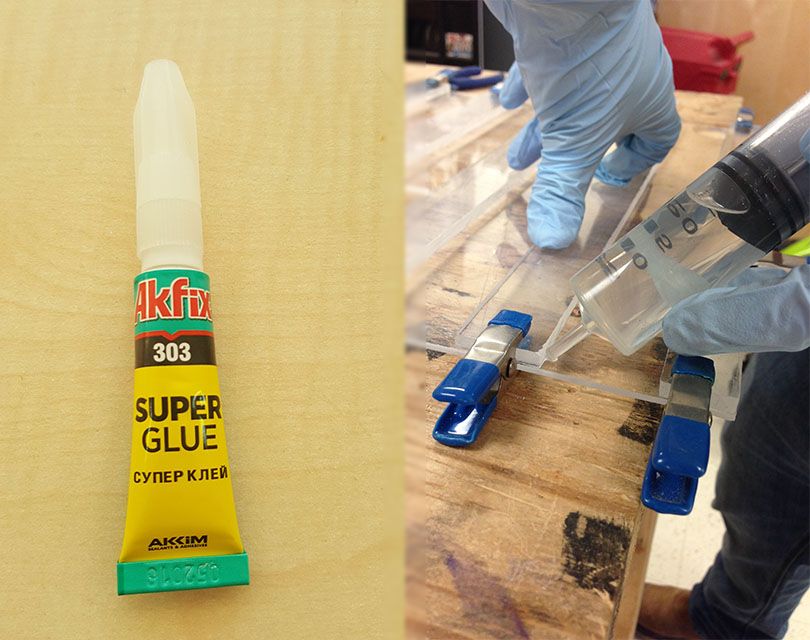Super Glue vs Epoxy
Two types of adhesives are common: epoxy and superglue. These glues offer a strong bond and multiple functions, making them a popular choice for DIY projects. But do you wonder what is the difference between Super Glue and Epoxy?
You will be able to decide which is best for you by learning the differences between the two. Let’s have a closer look at these two adhesives.
What is Super Glue?
Super glue is a special kind used at home to repair small jobs or for artistic purposes. Crazy glue is another name for Super Glue. To be more precise, superglue contains cyanoacrylate adhesive, its main component. Super glue is known for its fast bonding speed, usually just a few seconds. It is also very strong and can bond with almost any material. This makes it one of the most versatile adhesives.

When to use superglue
Choose super glue over epoxy if:
- It takes very little time to put the glue up.
- It is important to put the object to use immediately
- A weak joint is actually necessary that you can later tear open.
- You should not be concerned if epoxy is dangerous.
What materials can you glue with Super Glue?
This is a brief but comprehensive list of materials you can glue using Super Glue.
- Metal
- Ceramic
- Leather
- Rubber
- Vinyl
- Some plastics
- Wood
Although super glue won’t bond or hold as well as epoxy, it will be discreet enough to use on your items as it dries faster and is more easily visible.
Pros & Cons of Using Super Glue
Pros
- Super glue is much easier to apply than hot glue. However, it’s more complicated to remove. However, acetone (nail Polish Remover) can be used to remove it from your skin.
- It’s ideal for non-porous materials like metal and glass. Hot glue should not be considered for this type of application and if you intend to remove it after application the read this article for better understanding.
- This glue is ideal for fixing jewelry. It’s strong and durable. This glue is great for jewelry makers.
- It can also adhere flat-back rhinestones to fabric or other materials.
Cons
- Super glue stains fabrics. It can either make the fabric appear darker (like it is wet), or it will whiten once it sets.
- It is great for adhering rhinestones to fabrics. However, it should only be applied in a very small amount to avoid staining the fabric.
- It can also stain the paper. It’s good for cardboard but won’t work for other paper crafts that need glue. You should choose a Crafts Glue with no such effect that is safe for children.
What is Epoxy?
Epoxy is a two-step hardening adhesive. It is a two-step process. First, you put epoxy on the material to be attached. Then you add another substance called a “hardener”. Epoxy has many advantages that other adhesives don’t offer.
After mixing both ingredients, epoxies have to be cured. This process can take from a few moments to several hours. The epoxy must rest for several hours after curing to reach its full strength. After the epoxy has been set, it can be sanded and drilled.
Epoxy is less commonly used than super glue. While epoxy is not as efficient for small repairs and quick repairs, it has the advantage over superglue in some other areas.

When to Use Epoxy
Choose epoxy over super glue if:
- If you are looking for the strongest joint possible, it is worth mixing the glue and waiting for it to cure.
- If the parts don’t fit perfectly, always adjust them.
- If the glue joints have large dimensions
- If there are more than two parts to the assembly
What materials can you glue with epoxy?
This comprehensive, simple list of materials you can glue with epoxy.
- Metal
- Wood
- Cement
- Plastic
- PVC
- Ceramic
- Fiberglass
- Glass
Epoxy can glue your material together even if it isn’t listed. If you have a specific project in mind, ask a staff member at a hardware store for assistance.
Pros & Cons of Using Epoxy
Pros
- Excellent chemical resistance
- Excellent environmental resistance
- High-strength, tough bonds
- Many cure speeds are available
- Excellent void-filling abilities
- It can be thermally and electrically conductive
- Under sustained loads, resistance to creep
Cons
- Epoxies cured at room temperature do not work well above 120 degrees Celsius. A heat-cured epoxy is needed.
- Unmodified cured epoxy can become brittle.
- Two-part epoxy must be properly cured by using exact mixture ratios
- Slow cure times
Comparison: Epoxy vs Super Glue

After we’ve figured out many facts about super glue and epoxy, it’s time to compare them side-by-side.
-
Gap Filling
Gap filling refers to a glue’s ability to bridge large open areas in a glue joint. It is especially important when surfaces to be glued don’t fit together well.
Epoxies can be used to fill gaps. Epoxies are excellent for filling gaps. A thick epoxy joint will hold up to twice as well as a thinner joint. The chemical two-component reaction will also speed up the cure time. Epoxies with high viscosity are available in special thicker forms for very large gaps.
Super glues are, however, poor gap fillers. They are low in viscosity (i.e., they are fluid and can run off any surface that is not supporting them). Super glues don’t cure well in thick bonds due to the air- and surface-contact nature of hardening.
-
Applications
Superglue can be used in very small quantities. Still, it is also useful for small-scale repairs, assembly, and surgery. Super glue can also be used to finish wood. Super glue is usually only used in small applications. Epoxy, on the other side, has many other uses. It can be used as an adhesive and for many other purposes. Epoxy can coat metals or composites, insulate electronic devices, make models, and many other uses.
-
Tensile Strength
We have to distinguish between the two. There are two types of adhesives: tensile and shear strength. Superglue is very strong but has low shear strength. Epoxy has both shear- and tensile strengths.
It has a high tensile strength, which means it can withstand impacts and pull attempts. It will not come off in any circumstance. Superglue is very useful for certain projects because it has high shear strength.
However, epoxy is more practical and usable for general use.
-
Removability
It is easy to remove epoxy before it hardens. First, you cannot add hardener to epoxy. This will cause it not to harden. You can also use acetone or vinegar to remove the hardener if you have already added it. It is impossible to remove epoxy once it has hardened.
After it sets, Super Glue can easily be removed using acetone or GBL. This makes it less durable but is much easier to get rid of if needed.
-
Easy of Use
Super glue is more difficult to apply and prepare than epoxy adhesive. You just need to take the tube, apply it on the surface, and that’s all. Once it dries, you don’t need to do anything else.
You must mix epoxy resin and hardener correctly. Although it’s not difficult, it can be tricky for those who have never tried it. Before mixing epoxy adhesives, it is a good idea to consult an expert.
-
Finish
Epoxy is more flexible than superglue but tends to be less flexible when finishing. Super glue usually leaves a clear finish once it has dried. It is a good choice for small repairs and arts & crafts projects. You won’t notice superglue on objects unless you are looking for it.
epoxy glue can also be made in many different colours. There are epoxy adhesives that leave a clear, glue-like coating. If you need a thicker coating, you can get one in various colours and use acrylic paint also with epoxy. This is why so many people use it to create unique textures on different objects.
-
Health Warnings
Both of these glues are safe, but you shouldn’t inhale them. Super glue, which bonds to the skin quickly, is more irritating than epoxy and can cause irritation to the eyes, nose, and throat. Gloves are recommended when using super glue or other adhesives that bond to the skin quickly. Eye protection is recommended.
Convenience
Epoxy can be a challenge when it comes down to user experience. Mixing the two components can lead to a hectic and time-consuming process. Mixing the mixture requires careful mixing, which can be done manually or with machine support. Epoxy is difficult to handle because it is thick.
Superglue can be used in a very relaxed way. It has a thin texture and is easy to use. Users need to simply squeeze the tube and apply it to the area. This method is quicker and therefore saves time.
-
Shelf Life
Super Glue and epoxy both have different shelf lives. Most epoxies can be kept for a minimum of a few years after manufacturing. The life expectancy of epoxy is not affected by opening and closing the package again. Epoxy, unlike other glues, does not block or clog packaging caps or openings. It is, therefore, not rendered useless. This is due to epoxy’s two-component nature: it reacts with both the component and not with air or moisture.
On the other hand, even if not opened, super glues have a shelf-life of about a year. As hobbyists know, open superglue will no longer be in its original form. Super glue will be cured if air moisture comes into contact with it. This includes glue in the cap threads and applicator nozzles or brushes. Despite the best efforts of the manufacturer in packaging design and yours in sealing it after use, super glue is often a one-off product.
Is Superglue better than Epoxy?
It depends. It depends on the project. Super glue is a good choice, but Epoxy can be better for certain projects.
When mixed, superglues (cyanoacrylates) are made with a quick-curing resin, a curing accelerator, and a strong bond. Spread the super glue on two surfaces, and hold it until it cures.
This glue can be stored for up to five years after it has been mixed. The glue will set in less time than you think, so don’t hold them together for too long. It is best to let the glue dry for at least 30 minutes before applying pressure.
This glue is easy to use and can repair objects quickly. However, Epoxy is preferred by many because it’s more durable. They are stronger and less likely to crack if subjected to too much pressure.
Conclusion
For the average homeowner, Super Glue is often better to use. It is easier to use, cheaper to remove and easier to use. The strength of epoxy is not necessary for most homeowners. Fast-acting glue is more cost-effective and easier to use than epoxy.
However, epoxy is best for larger projects. This is a good choice if you have to fill in large gaps or create a surface you can work with. This is why it’s used for model-making and industrial purposes. While you can drill into epoxy, Super Glue is not possible.
Frequently Asked Questions
How Strong is Epoxy Adhesive?
Epoxy is the strongest reactive adhesive. It is resistant to UV light, high temperatures, solvents, and impact. Epoxy can typically hold 300 lbs of tensile force.
Epoxy vs Super glue, Which Is Best?
They form a strong bond and can be used for specific purposes. Your project will determine which type to choose. Super glue has a lower shear strength but is much easier to use. Epoxy has a higher structural strength.
How long does epoxy glue last?
It depends on the product and conditions. Epoxy glue can be applied correctly to any surface and will last seemingly indefinitely. This glue forms an extremely strong bond.
How long can you store glue?
When kept at room temperature, epoxy glue can last approximately two years. Super glue must be kept in a cool, dry place with the cap tightly on. It can be kept closed well for a few months.
How can I remove epoxy from my skin?
If you are able, rinse the epoxy immediately underwater. You may try rubbing vinegar or acetone to remove epoxy that has dried on your skin.
Can superglue be used in industrial applications?
Super glue is not strong enough for more heavy-duty projects. Use epoxy if you are working in an industrial environment.

Being associated with art and craft field since decades as a hobbyist and life long learner has given me an opportunity to learn many new things related to art, craft, paints and pottery which i am trying to share with your guys on this website. I have expertise of being professional painter and potter for the last 20+ years
I have learned mind blowing cool tips and insights which makes me a person with ability to improvise and come up with creative ideas and solutions to make stunning and impeccable art pieces of all types which are adored by people across the globe on this website and other platform.


